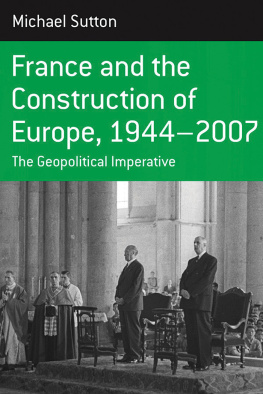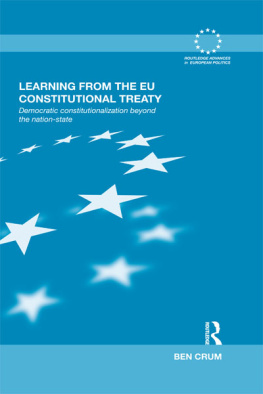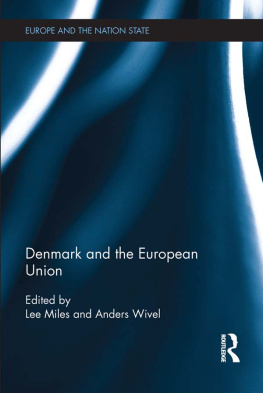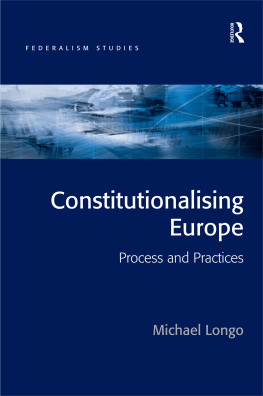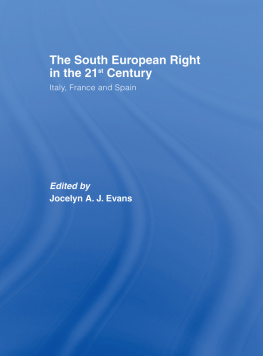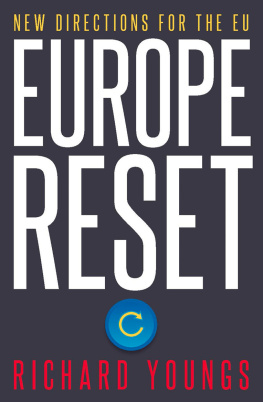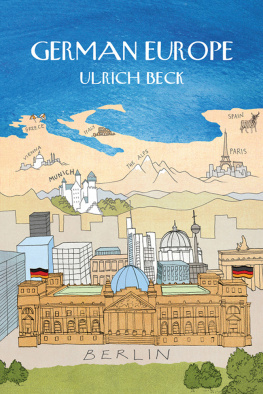FRANCE AND THE CONSTRUCTION OF EUROPE, 19442007BERGHAHN MONOGRAPHS IN FRENCH STUDIES
The Populist Challenge: Political Protest and Ethno-Nationalist
Mobilization in France
Jens Rydgren
French Intellectuals Against the Left: The Antitotalitarian Moment of the 1970s
Michael Scott Christofferson
Sartre Against Stalinism
Ian H. Birchall
Sartre, Self-Formation and Masculinities
Jean-Pierre Boul
The Bourgeois Revolution in France (17891815)
Henry Heller
Gods Eugenicist: Alexis Carrel and the Sociobiology of Decline
Andrs Horacio Reggiani
France and the Construction of Europe, 19442007: The Geopolitical Imperative
Michael Sutton
First published in 2007 by
Berghahn Books
www.berghahnbooks.com
2007, 2011 Michael Sutton
First ebook edition published in 2014
All rights reserved.
Except for the quotation of short passages
for the purposes of criticism and review, no part of this book
may be reproduced in any form or by any means, electronic or
mechanical, including photocopying, recording, or any information
storage and retrieval system now known or to be invented,
without the written permission of Berghahn Books.
Library of Congress Cataloging-in-Publication Data
Sutton, Michael, 1942-
France and the construction of Europe, 1944-2007 : the geopolitical imperative / Michael Sutton.
p. cm. -- (Berghahn monographs in French studies)
Includes bibliographical references and index.
ISBN 978-1-84545-393-0 (hbk) -- ISBN 978-0-85745-290-0 (pbk) -- ISBN 978-0-85745-292-4 (ebk)
1. France--Foreign relations--1945- 2. France--Politics and government--1945- 3. France--Foreign relations--European Union countries. 4. Europe Union countries--Foreign relations--France. I. Title.
DC404.S87 2007
327.440409'045--dc22 2007044676
British Library Cataloguing in Publication Data
A catalogue record for this book is available from the British Library.
ISBN: 978-1-84545-393-0 (hardback)
ISBN: 978-0-85745-290-0 (paperback)
ISBN: 978-0-85745-292-4 (ebook)
In memory of Anthony Hartley and Maurice LarkinPREFACE
The general aim of this book is to address the question of the significance of Frances role in what the French themselves term la construction europenne. This French expression, whose literal English translation (the European construction) does not have the same allusive force, conjures up the element of voluntarism that has been characteristic of Frances own role. As is indicated by the books subtitle, it is a role which, in this authors judgement, has been largely shaped by geopolitical considerations.
The period covered is the past sixty years or so, apart from some setting of the earlier historical background. It starts with the liberation of Paris in August 1944, when Charles de Gaulle assumed power at the head of the new Provisional Government of the French Republic. And, marking perhaps the end of an era in French politics, it concludes with the stepping down from office of Jacques Chirac, the last of the Fifth Republics presidents to have been a political contemporary of de Gaulle.
The book is proffered to the reader as an exercise in contemporary history, and the author will be rightly satisfied if the story told is judged to be coherent and well founded. As a work of history, the methodological assumptions are Oakeshottian in kind broadly in keeping, that is, with Michael Oakeshotts reflections on the nature of history. To the extent that it is a study belonging also to the academic discipline of international relations, it lies analytically within the tradition of the English School; this is largely on account of the implicit use of Martin Wights concept of a society of states. More generally, Elie Kedouries finely crafted writings on politics and international affairs have provided a model of style and analysis to be aspired to.
Aston University, whose staff I joined in 1995, has provided me with a good academic home and environment for writing a work of this kind. The works inspiration has also come from questions I have confronted elsewhere, analysing European economic developments during some twenty years spent in Brussels from the early 1970s to the early 1990s, and, overlapping this period, during the course of nearly a quarter centurys association with the Economist Intelligence Unit (EIU). Stimulation also came in the first half of the 1990s from teaching international relations, including European integration, at Boston Universitys London Graduate Center and at the Maria Curie-Skodowska University in Lublin, Poland. I am grateful to my colleagues, past and present, in the worlds of praxis and theory for their intellectual liveliness and for what I have learnt from them. And this gratitude extends, of course, to all who have provided library and information support.
The work in its wide sweep is essentially one of synthesis, rather than of narrowly focused scholarship at the academic coalface. It draws heavily on the labours of other scholars whose research has been largely based on the painstaking consultation of unpublished diplomatic and personal archives. Such reliance has been greater for the early part of the period studied, though some excellent works based substantially on archival material have already been published on the recent enough subject of German unification in its international context. On the other hand, extensive use has been made of published official documents and I hope, not uncritically memoirs and similar first-hand material. In shaping the broader picture, I am especially indebted to the scholarship of Georges-Henri Soutou, Maurice Vasse, and Frdric Bozo, and, for the pre-war period, Anthony Adamthwaite.
I have drawn in some chapters on my own nonacademic yet research-based published writings, especially those for the EIUs regular quarterly reports on France and, secondly, for Report from Brussels, a monthly economics newsletter, now defunct, which I edited during my long stay in Europes capital. Unless otherwise indicated, the translations of French quotations are mine; exceptions are those drawn from Richard Maynes translations of Jean Monnets Mmoires and Jean-Baptiste Duroselles LEurope. Histoire de ses peuples, and also those drawn from A. G. Harryvan and J. van der Harsts Documents on European Union.
Charles Jenkins at the EIU heads the list of persons to whom special thanks are due. Without his invitation in 1985 to write regularly on political and economic developments in France, this book would never have materialised. My EIU editor, Philip Whyte, greatly helped me by critically reading the completed manuscript in one fell swoop and commenting upon it. On the academic front, Nicolas Brdos-Fltoronyi and Rdiger Grner were assiduous readers from the start, making suggestions and giving constant and much appreciated support. Other willing academic readers, sparing generously of their time, included David Howarth, Jean-Claude Koeune, the late Maurice Larkin, Conrad Reuss, and Georgios Varouxakis. Jacques Prvotat provided strong encouragement as always. Useful books were thrust into my hands by Genevive Mosseray, Chad Peterson, and (again) Georgios Varouxakis. Other helpers in the field included Rory Clarke, Said Haddadi, Jrg Mathias, Nathalie Mrgudovic, and Anne Stevens. In its last stage, the work benefited considerably from, first, the report of Berghahns anonymous reader and, secondly, the comments and proposals of Irwin Wall, the series editor. The final improvements, so important for any author, came through the good work of the production and copy editors, Anna Wright and Cecilia Busby respectively. Marion Berghahn has been an attentive, engaged and supportive publisher. For the help, pertinent remarks, criticisms, and suggestions of all involved, I am most grateful. The usual disclaimer applies mine alone are the faults.

